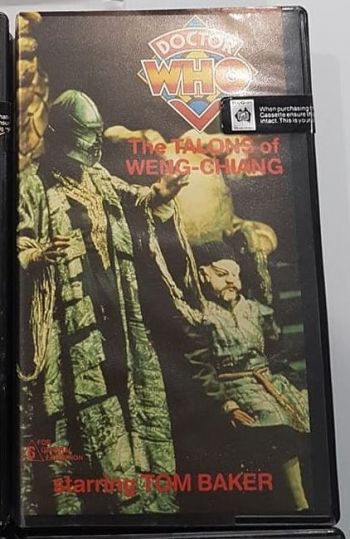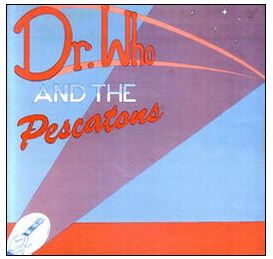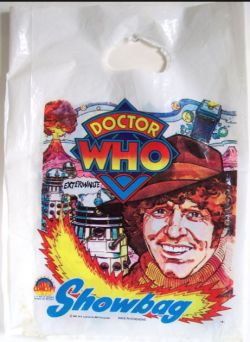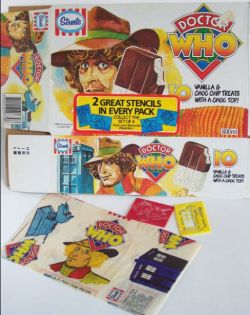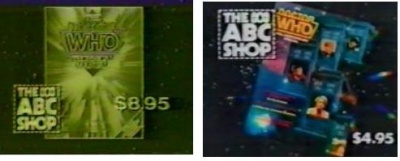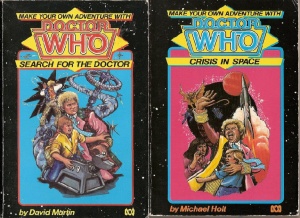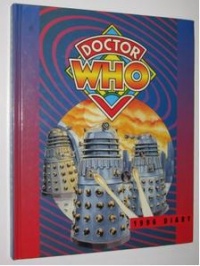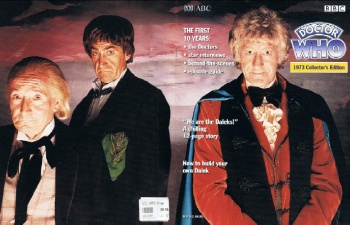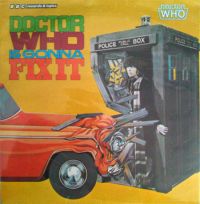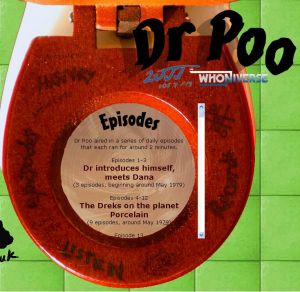Australian Merchandise
AUSTRALIAN MERCHANDISE
There are several items of Doctor Who merchandise that are unique to Australia. These are just some of them.
VIDEO TAPES, DVDs, BLU-RAYS
VHS
The BBC videos were released in Australia initially by Polygram. Tapes were authored, printed, assembled and distributed in Sydney, so by those respects they count as Australian products. In general (and bar a few exceptions), the covers were the same as the UK tapes, with minor modification to the front, spine and back layout to incorporate Polygram logos, classification ratings codes and legal disclaimers.
The first twelve titles at least were issued in both VHS and Betamax. The first tapes retailed for an eye-watering A$49.95 in both formats. Subsequent tapes were at the much lower cost of A$39.95, eventually dropping to a more affordable A$29.95 as the range progressed.
The initial set was priced that high as they were intended mainly for the rental market. Cheaper discounted tapes were later reissued for retail, and these can be easily identified by their having barcodes added to them (see below).
The release schedule was rather haphazard to begin with, but when the BBC began to release each new story on a more consistent frequency by the early 1990s, Polygram followed suit, and apart from one or two exceptions, the Australian tapes were on shop shelves only a matter of months after the UK.
As noted in the Peter Cushing section above, the initial batch of tapes were not required to be classified by the censorship board. When the Australian Federal Government revised the "Film and Video Classification Act 1984" with effect from 10 December 1984, all existing titles had to be submitted for retrospective classification ratings. This is why some of the Australia tapes have variant covers - ones with and ones without rating symbols printed on them or affixed by a sticker.
The tapes were released in this order, with the dates given taken from available contemporary publicity material:
- Revenge of the Cybermen - released by December 1984
- The Brain of Morbius - August 1985
- Pyramids of Mars - October 1985
- The Seeds of Death - by mid-1986
- The Robots of Death - by late-1986
The next two tapes issued by Polygram were exclusive to Australia, as they had not been released in the UK at that time – plus they were uncut. These had photographic covers that were not later used on the British tapes; they were also released on Betamax (they were only on VHS in the UK) making them unique in several respects:
- Terror of the Zygons - April 1987
- The Talons of Weng-Chiang - April 1987
After this, came two Dalek stories, followed six months later by the 20th anniversary special, which had been delayed for some time, possibly due to the Dalek 'cameo'. All three also had a Betamax release; in the case of Death to the Daleks this format was unique to Australia:
- Day of the Daleks - October 1987
- Death to the Daleks - December 1987
- The Five Doctors - May 1988
Two more Polygram exclusives came out in early 1989 in both formats, again with photographic covers not used on the subsequent UK editions, making them unique collectibles. These were also the final two stories released on Betamax in Australia:
- The Ark in Space - January 1989
- The Time Warrior - March 1989
After these two exclusives, the tape schedule began to mirror that of the UK - starting with Spearhead from Space in January 1990 the tapes were released by Polygram on a more regular monthly cycle; these were all issued on VHS only.
While the BBC usually released 6-parters or multi-story sets on two cassettes in double-sized packaging, Polygram (and later Roadshow - see below) was able to fit these stories onto a single tape - for example, the double tape set with The Rescue and The Romans in the UK was on a single tape in Australia. (The only stories released in Australia in two separate tape boxes were The Daleks, The War Games, The Dalek Invasion of Earth, The Sontaran Experiment with Genesis of the Daleks, and The King's Demons with The Five Doctors Special Edition. The Sontaran / Genesis set was later re-issued as two tapes inside a single double-sized case.)
When Polygram's US parent company was bought by Paramount Pictures in 1995, the BBC had to find a new distributor for the Australian market. The final Polygram Australian title was Frontier in Space in November of that year.
From April 1996, Roadshow Entertainment (aka Village Roadshow) became the new supplier of tapes "down under" for Australia and New Zealand. Their first tape was The Sea Devils. This and all subsequent new titles and reissues of earlier titles started at A$24.95, before rising to reach A$31.95 by 2003.
(Since it wasn't a BBC production, the 1996 TV Movie was released through Rainbow Products Ltd, who were the Australian distributors for CIC Video / CIC-Taft, who held the worldwide rights to the eighth Doctor's sole adventure.)
From 1996 onwards, the UK tapes featured the new "McGann" logo, however the Roadshow Australian tapes retained the "diamond" logo on the box covers for a few more years.
Village Roadshow also reissued many of the earlier Polygram titles at a much cheaper price. These "low cost" tapes are easily identifiable by the Village Roadshow "V" and ABC logos on the spine and back cover.
An authoring error meant the first batch of The Tenth Planet tapes (issued in a "Cyberman tin" with Attack of the Cybermen) went out minus the reconstruction of the missing part four, and despite the cover of The Face of Evil stating it had Louise Jameson's appearance on "Swap Shop", this bonus extra was absent from the Australian edition.
Only one story could not be released on VHS: due to copyright issues relating to the 1950s incidental music, Delta and the Bannermen couldn't be cleared for sale in Australia and New Zealand.
Roadshow continued as the Australian distributor of the tapes through until the natural end of range when the final story was released in December 2003. By then, Roadshow had also become the exclusive distributor of the new DVD range (with Region 4 encoding) that had debuted in October 2000.
DVD / BLU-RAY
The subsequent DVD range followed the release schedule and order as that of the UK, with each new title usually coming out three months later. The discs and packaging were authored and printed in Sydney, using the same masters as the UK, although the "Coming Soon" trailers for the next DVD release were omitted, as Roadshow wanted the flexibility of changing the release order if they so wished - although this never eventuated, rendering the process of removing the trailers somewhat pointless!
Tapes and DVDs released in 2003 during the series' 40th anniversary had the same special packaging as the UK discs; Resurrection of the Daleks came in an outer rubber sleeve imprinted with Dalek-like 'bumps', and The Three Doctors came with a Corgi model of Bessie.
In 2018, the first two Doctor Who Collection Blu-ray sets - Season 12 and Season 19 - were distributed in Australia only by Roadshow (Region B) (New Zealand missed out). The packaging was identical to the UK releases, including the outer cardboard 'sleeve'.
Starting with the third set - Season 18 - the Blu-rays were released by Universal / Sony Pictures Australia. For these and subsequent sets the packaging was different; the outer cardboard 'sleeve' was dispensed with, and the 'booklet' inside sat in a slot rather than behind a double hinged TARDIS-shaped 'door'.
Universal / Sony continued to issue Australian editions (also sold in New Zealand) of the Doctor Who DVD and Blu-ray releases until 2023.
From 2024 on, Madman Entertainment picked up the distribution rights, although several box sets were delayed during the hand-over period.
BOOKS, RECORDS AND OTHER ITEMS
Target paperback books were readily available in Australia from the beginning. The first novel, based on The Daleks, was published in 1973, and retailed for 80c. The cover price for the books steadily increased over the years, with the Recommended Retail Price pre-printed on the backs of the books reaching A$5.95 by the early 1990s.
The distributor of the books throughout the 1970s had been Rical Enterprises Pty Ltd. When the company went bankrupt in late 1980, the unsold stock of around 10,000 books was acquired by a prominent member of the Australian fan club and sold through mail-order.
In mid-1981, the book rights were picked up by Carnation, who manufactured condensed milk products, but only a few months later they closed their book distribution division.
Magazine distributor Gordon & Gotch acquired the book rights in late 1981, and from mid-1982, they released all new paperback titles until the end of the regular range. Gordon & Gotch were also the distributor of Doctor Who Magazine.
During the late 1980s, the hardbacks were handled by Hutchinson Publishing Group (Aust) Pty Ltd. The "blue spine" paperback reprints of the early 1990s were available through Hodder & Stoughton.
Several items of merchandise unique or specific to Australia have also been released over the years. While it is beyond the scope of even BroaDWcast to attempt to catalogue all of these, those of interest include:
- ABC-branded publicity post-cards and sticker, many of which featured Tom Baker who visited Australian in 1979 and 1980
- There were Australian pressings of LPs and singles, such as the Century 21 record "The Daleks" (a cut-down retelling of The Chase part 6) and Jon Pertwee's "Who is the Doctor".
- The audio drama "Dr Who and the Pescatons" had a local pressing (R-06037) available through mail-order only from World Record Club (based in Hartwell, Victoria) in 1979.
- Two highly sought-after items are the Dr Who Showbags of which there are two known variants. The first of these – which was a paper-bag printed with the diamond logo - was available from the BBC stand at the 1980 Sydney Royal Easter Show and the annual Royal Melbourne agricultural show. The following year (and also 1982), the showbag was plastic printed with the series' logo and an illustration of the fourth Doctor, the TARDIS, several Daleks and an exploding volcano! Inside these bags were a badge, two bottles of invisible ink, a cardboard jigsaw puzzle featuring Daleks (two known variants), a poster art kit and felt pens, a Weetabix board game, and a fold-out mini cardboard TARDIS and Doctor standee. (All these items bear a 1978 copyright date, which is why these Showbags are often incorrectly dated as being from that year.)
- An unlicenced computer game called "Dalek Chase" was released in mid- 1980. It was designed by amateur programmers for the Tandy TRS-80 microcomputers and the Dick Smith System 80 16K Level II machines. (It was available on mail order only for $15.)
- Doctor Who iced confection – made by Streets in late 1981, these "Vanilla & Choc Chip Treats with a Choc Top!" came in wrappers featuring the fourth Doctor and K9, and each pack contained "2 great stencils / collect the set of 4". (Animated TV adverts for the iced lolly featuring the fourth Doctor and K9 aired on the commercial stations in early 1982, but not the ABC! See video below.)
- Doctor Who Technical Manual (1983) – was the same as the UK edition, but with the ABC's logo on the cover; published and printed in Australia by J M Dent Pty Ltd (Retailed for $8.95)
- BBC Doctor Who 20th Anniversary Special – was the same as the UK's 1983 Radio Times publication, but with slightly different cover text. It was distributed in Australia (25,000 copies) and New Zealand (5,000) by Pitman (Retailed for $4.95)
- Make Your Own Adventure - only the first two books in this series - "Search for the Doctor" and "Crisis in Space" - were released with the ABC's logo on the cover; published by J M Dent Pty Ltd in 1986 (Retailed for $4.95) [advertisements for the books aired on the ABC in mid-1986]
- 1996 Diary – was published by Mallon Publishing Pty Ltd and distributed by Angus & Robertson Book World
- In 2003, the 1973 Radio Times' 10th anniversary special was reissued as a limited edition facsimile reprint. The ABC published its own edition of the magazine, which was identical in all respects except for the cover, and some text at the bottom of the column with the 'copyright' blurb on page 3. It retailed for $9.95. (The magazine also had a New Zealand price of $10.95, but there is some doubt that the magazine was ever available in that country.)
Many of the videos, books, magazines, records and other forms of merchandise were sold through The ABC Shop, a chain-store owned and operated by the broadcaster, usually selling TV-tie-in material. Although the ABC was a non-commercial broadcaster, television spots for products sold through the chain were permitted as they were classed as "self-promotion" (similar to the way the BBC advertised videos and books based on its programmes). Voice-over 'adverts' for The ABC Shop were sometimes played over the closing credits, or short in-vision ads for Doctor Who merchandise appeared after the programme.
Other examples of 'unique to Australia' merchandise are the novelty items:
- Jackson Zumdish: "I Wanna Be Doctor Who" (Agro Fish, 1980) (the band was based in Adelaide; the single was not issued with a cover sleeve)
- Bullamakanka: "Dr Who" (aka "The Ballad of Dr Who") (45 RPM single, RCL 1983) (It was also released in the UK as "Dr Who is Gonna Fix It"; the US pressing came in a unique illustrated picture sleeve showing a car crashing into the TARDIS, as illustrated here)
- A parody called "Dr Poo", a 2-minute comedy radio serial that broadcast over 450 episodes in one massive run, from 1979 to 1981(?) inspired a couple of LPs – such as "Dr Poo and the Psychic Koalas", released in 1985 .
|
|
|
BULLAMAKANKA |
